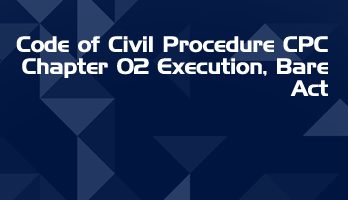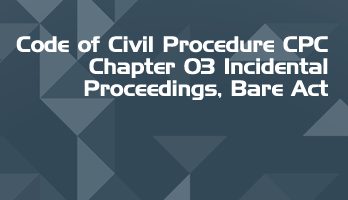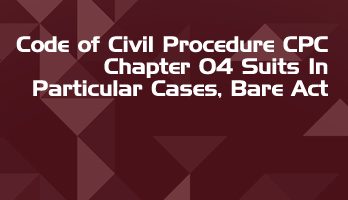A 'Bare act' is the actual legislation passed by the Parliament of India. Generally, an act sets out the high level legal and policy principles applicable to the subject matter of the law.
Most acts are accompanied by 'subsidiary legislation' such as rules, regulations, notifications and orders; which address the actual implementation detail of the act.
Free Full Course Available on LawMint's YouTube Channel
How to Land Your Dream LLB Internship in a Top Law Firm
- Part 1 - Introduction
- Part 2 - Internship Planning
- Part 3 - Internship Research
- Part 4 - Building Your Profile
- Part 5 - The Email
- Part 6 - The Resume
- Part 7 - The Cover Letter
- Part 8 - The Interview
- Part 9 - Self Development
Practical and comprehensive course, with real examples and step-by-step analysis of the complete internship application process. Check out LawMint's YouTube channel now!
Negotiable Instruments Act, 1881
Chapter III – Parties to Notes, Bills and Cheques
Section 26 – Capacity to make, etc., promissory notes, etc.
Every person capable of contracting, according to the law to which he is subject, may bind himself and be bound by the making, drawing, acceptance, indorsement, delivery and negotiation of a promissory note, bill of exchange or cheque. Minor. A minor may draw, indorse, deliver and negotiate such instrument so as to bind all parties except himself. Nothing herein contained shall be deemed to empower a corporation to make, indorse or accept such instruments except in cases in which, under the law for the time being in force, they are so empowered.
Section 27 – Agency
Every person capable of binding himself or of being bound, as mentioned in section 26, may so bind himself or be bound by a duly authorized agent acting in his name. A general authority to transact business and to receive and discharge debts does not confer upon an agent the power of accepting or indorsing bills of exchange so as to bind his principal. An authority to draw bills of exchange does not of itself import an authority to indorse.
Section 28 – Liability of agent signing
An agent who signs his name to a promissory note, bill of exchange or cheque without indicating thereon that he signs as agent, or that he does not intend thereby to incur personal responsibility, is liable personally on the instrument, except to those who induced him to sign upon the belief that the principal only would be held liable.
Section 29 – Liability of legal representative signing
A legal representative of a deceased person who signs his name to a promissory note., bill of exchange or cheque is liable personally thereon unless he expressly limits his liability to the extent of the assets received by him as such.
Section 30 – Liability of drawer
The drawer of a bill of exchange or cheque is bound, in case of dishonour by the drawee or acceptor thereof, to compensate tile holder, provided due notice of dishonour has been given to, or received by, the drawer as hereinafter provided.
Section 31 – Liability of drawee of cheque
The drawee of a cheque having sufficient funds of the drawer in his hands properly applicable to the payment of such cheque must pay the cheque when duly required so to do, and, in default of such payment, must compensate the drawer for any loss or damage caused by such default.
Section 32 – Liability of maker of note and acceptor of bill
In the absence of a contract to the contrary, the maker of a promissory note and the acceptor before maturity of a bill of exchange are bound to pay the amount thereof at maturity according to the apparent tenor of the note or acceptance respectively, and the acceptor of a bill of exchange at or after maturity is bound to pay the amount thereof to the holder on demand. In default of such payment as aforesaid, such maker or acceptor is bound to compensate any party to the note or bill for any loss or damage sustained by him and caused by such default.
Section 33 – Only drawee can be acceptor except in need or for honour
No person except the drawee of a bill of exchange, or all or some of several drawees, or a person named therein as a drawee in case of need, or an acceptor for honour, can bind himself by an acceptance.
Section 34 – Acceptance by several drawees not partners
Where there are several drawees of a bill of exchange who are not partners, each of them can accept it for himself, but none of them can accept it for another without his authority.
Section 35 – Liability of indorser
In the absence of a contract to the contrary, whoever indorses and delivers a negotiable instrument before maturity without, in such indorsement, expressly excluding or making conditional his own liability, is bound thereby to every subsequent holder, in case of dishonour by the drawee, acceptor or maker, to compensate such holder for any loss or damage caused to him by such dishonour, provided due notice of dishonour has been given to, or received by, such indorser as hereinafter provided. Every indorser after dishonour is liable as upon an instrument payable on demand.
Section 36 – Liability of prior parties to holder in due course
Every prior party to a negotiable instrument is liable thereon to a holder in due course until the instrument is duly satisfied.
Section 37 – Maker, drawer and acceptor principals
The maker of a promissory note or cheque, the drawer of a bill of exchange until acceptance, and the acceptor are, in the absence of a contract to the contrary, respectively liable thereon as principal debtors, and the other parties thereto are liable thereon as sureties for the maker, drawer or acceptor, as the case may be.
Section 38 – Prior party a principal in respect of each subsequent party
As between the parties so liable as sureties, each prior party is, in the absence of a contract to the contrary, also liable thereon as a principal debtor in respect of each subsequent party.
Illustrations
A draws a bill payable to his own order on B, who accepts. A afterwards indorses the bill to C, C to D, and D to E. As between E and B, B is the principal debtor, and A, C and D are his sureties. As between E and A, A is the principal debtor, and C and D are his sureties. As between E and C, C is the principal debtor and D is his surety.
Section 39 – Suretyship
When the holder of an accepted bill of exchange enters into any contract with the acceptor which, under section 134 or 135 of the Indian Contract Act, 1872 (9 of 1872), would discharge the other parties. The holder may expressly reserve his right to charge the other parties, and in such case they are not discharged.
Section 40 – Discharge of indorser’s liability
Where the holder of a negotiable instrument, without the consent of the indorser, destroys or impairs the indorser’s remedy against a prior party, the indorser is discharged from liability to the holder to the same extent as if the instrument had been paid at maturity.
Illustrations
A is the holder of a bill of exchange made payable to the order of B, which contains the following indorsements in blank: First indorsement, “B.” Second indorsement, “Peter Williams.” Third indorsement, “Wright & Co.” Fourth indorsement, “John Rozario.” This bill A puts in suit against John Rozario and strikes out, without John Rozario’s consent, the indorsements by Peter Williams and Wright & Co. A is not entitled to recover anything from John Rozario.
Section 41 – Acceptor bound, although, indorsement forged
An acceptor of a bill of exchange already indorsed is not relieved from liability by reason that such indorsement is forged, if he knew or had reason to believe the indorsement to be forged when he accepted the bill.
Section 42 – Acceptance of bill drawn in fictitious name
An acceptor of a bill of exchange drawn in a fictitious name and payable to the drawer’s order is not, by reason that such name is fictitious, relieved from liability to any holder in due course claiming under an indorsement by the same hand as the drawer’s signature, and purporting to be made by the drawer.
Section 43 – Negotiable instrument made, etc., without consideration.
A negotiable instrument made, drawn, accepted, indorsed or transferred without consideration, or for a consideration which fails, creates no obligation of payment between the parties to the transaction. But if any such party has transferred the instrument with or without indorsement to a holder for consideration, such holder, and every subsequent holder deriving title from him, may recover the amount due on such instrument from the transferor for consideration or any prior party thereto.
Exceptions
- No party for whose accommodation a negotiable instrument has been made, drawn, accepted or indorsed can, if he have paid the amount thereof, recover thereon such amount from any person who became a party to such instrument for his accommodation.
- No party to the instrument who has induced any other party to make, draw, accept, indorse or transfer the same to him for a consideration which he has failed to pay or perform in full shall recover thereon an amount exceeding the value of the consideration (if any) which he has actually paid or performed.
Section 44 – Partial absence or failure of money consideration
When the consideration for which a person signed a promissory note, bill of exchange or cheque consisted of money, and was originally absent in part or has subsequently failed in part, the sum which a holder standing in immediate relation with such signer is entitled to receive from him is proportionally reduced.
Explanations
The drawer of a bill of exchange stands in immediate relation with the acceptor. The maker of a promissory note, bill of exchange or cheque stands in immediate relation with the payee, and the indorser with his indorsee. Other signers may by agreement stand in immediate relation with a holder.
Illustrations
A draws a bill on B for Rs. 500 payable to the order of A. B accepts the bill, but subsequently dishonours it by non – payment. A sues B on the bill, B proves that it was accepted for value as to Rs. 400, and as an accommodation to the plaintiff as to the residue. A can only recover Rs. 400.
Section 45 – Partial failure of consideration not consisting of money
Where a part of the consideration for which a person signed a promissory note, bill of exchange or cheque, though not consisting of money, is ascertainable in money without collateral enquiry, and there has been a failure of that part, the sum which a holder standing in immediate relation with such signer is entitled to receive from him is proportionally reduced.
Section 45A – Holder’s right to duplicate of lost bill
Where a bill of exchange has been lost before it is over – due, the person who was the holder of it may apply to the drawer to give him another bill of the same tenor, giving security to the drawer, if required, to indemnify him against all persons whatever in case the bill alleged to have been lost shall be found again. If the drawer on request as aforesaid refuses to give such duplicate bill, he may be compelled to do so.
Important Central Acts in Regional Languages
Legislative department website also features regional language versions of several important Central Acts.
Free Full Course Available on LawMint's YouTube Channel
How to Land Your Dream LLB Internship in a Top Law Firm
- Part 1 - Introduction
- Part 2 - Internship Planning
- Part 3 - Internship Research
- Part 4 - Building Your Profile
- Part 5 - The Email
- Part 6 - The Resume
- Part 7 - The Cover Letter
- Part 8 - The Interview
- Part 9 - Self Development
Practical and comprehensive course, with real examples and step-by-step analysis of the complete internship application process. Check out LawMint's YouTube channel now!












